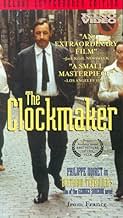IMDb RATING
7.1/10
2.9K
YOUR RATING
A Watchmaker finds out one day that his son has become a murderer. He tries to understand for whom and why.A Watchmaker finds out one day that his son has become a murderer. He tries to understand for whom and why.A Watchmaker finds out one day that his son has become a murderer. He tries to understand for whom and why.
- Awards
- 4 wins & 1 nomination total
Storyline
Did you know
- TriviaThe house where Michel meets the old lady who took care of his son is the house where Bertrand Tavernier lived his childhood with his parents during WWII. René Tavernier was a friend of Louis Aragon and Elsa Triolet.
- GoofsAt 33:08' a waiter enters the police station with a tray with four beers. Camera cuts to the adjacent office and when it returns, there are only two beer bottles left.
- Crazy creditsto Jacques Prevert
- ConnectionsEdited into Le documentaire culturel: Le siècle de Simenon (2014)
Featured review
The Clockmaker is a technically well-crafted precision endeavor in direction, writing, and acting. Director Bertrand Tavernier fashions a subtle, conservative character study asserted into the framework of a crime story, a study of an aging, middle-class clockmaker with a downcast disposition, played, or rather inhabited, by Philippe Noiret. This commonplace man is stunned out of his sluggishness when he finds out that his only son has been arrested for murder.
What is poignant about this story, and what improves the usually dormant drama of a crime film, is that Noiret lives quietly, alone with his son, who is almost grown up. In other words, his son is his whole tranquil life. Yet, when a detective played by mulishly tenacious Jean Rochefort asks him for help with the case, Noiret grasps how little he knows about his son, and struggles with his feeling that he is unable to blame him.
The film opens on Noiret having a night out, when his friends crack wise on the elections, the leftists, a protest rally, and the death penalty. He has fun this night. The next day two policemen come to his shop and rummage around his adjoining apartment. They particularly search his son's room before taking him to the police station where Rochefort tells him his son is wanted for murder of a security guard at the place where his girlfriend was fired, and has not been apprehended. There was even an eyewitness.
Tavernier puts Noiret's character through a motley crew of odd dramatic angles aside from just the press, who are of course just interested in ratings, but also tangents to the main thread of the film like right-wing hooligans who vandalize his window and two girls who confirm how vile the murdered guard was to women. The skillful essence of the film is in the abstractness of it, giving us impressions of how much his relationship with his son means to him, and how bewildered he is that he has no idea what to do to help his son, such as in his transit back home from the precinct and can't stand without feeling ill and has to ask a passenger for his seat.
The film is not hard-hitting enough to be great, but it serves its locale with an authentic atmosphere. The story itself, no matter how well it poignantly portrays a world in miniature, is nevertheless very slight. On the whole, The Clockmaker is a dramatic exercise. As many other French films from the 1960s and '70s were, it is less about telling the story and more about technique. It doesn't compare to the boisterousness and self-consciousness of most of the New Wave films of that time, and in fact is a particularly subtle film. It is essentially a film that says of film-making, "Yes, less is more."
What is poignant about this story, and what improves the usually dormant drama of a crime film, is that Noiret lives quietly, alone with his son, who is almost grown up. In other words, his son is his whole tranquil life. Yet, when a detective played by mulishly tenacious Jean Rochefort asks him for help with the case, Noiret grasps how little he knows about his son, and struggles with his feeling that he is unable to blame him.
The film opens on Noiret having a night out, when his friends crack wise on the elections, the leftists, a protest rally, and the death penalty. He has fun this night. The next day two policemen come to his shop and rummage around his adjoining apartment. They particularly search his son's room before taking him to the police station where Rochefort tells him his son is wanted for murder of a security guard at the place where his girlfriend was fired, and has not been apprehended. There was even an eyewitness.
Tavernier puts Noiret's character through a motley crew of odd dramatic angles aside from just the press, who are of course just interested in ratings, but also tangents to the main thread of the film like right-wing hooligans who vandalize his window and two girls who confirm how vile the murdered guard was to women. The skillful essence of the film is in the abstractness of it, giving us impressions of how much his relationship with his son means to him, and how bewildered he is that he has no idea what to do to help his son, such as in his transit back home from the precinct and can't stand without feeling ill and has to ask a passenger for his seat.
The film is not hard-hitting enough to be great, but it serves its locale with an authentic atmosphere. The story itself, no matter how well it poignantly portrays a world in miniature, is nevertheless very slight. On the whole, The Clockmaker is a dramatic exercise. As many other French films from the 1960s and '70s were, it is less about telling the story and more about technique. It doesn't compare to the boisterousness and self-consciousness of most of the New Wave films of that time, and in fact is a particularly subtle film. It is essentially a film that says of film-making, "Yes, less is more."
- How long is The Clockmaker?Powered by Alexa
Details
- Release date
- Country of origin
- Language
- Also known as
- The Clockmaker of St. Paul
- Filming locations
- Production company
- See more company credits at IMDbPro
- Runtime1 hour 45 minutes
- Sound mix
- Aspect ratio
- 1.66 : 1
Contribute to this page
Suggest an edit or add missing content


![Watch Bande-annonce [OV]](https://m.media-amazon.com/images/M/MV5BZTA2YTQxYjYtNTE3NS00NTg0LWFiMjItMzgyMmZjYzdhMTJlXkEyXkFqcGdeQXRyYW5zY29kZS13b3JrZmxvdw@@._V1_QL75_UY281_CR6)




























